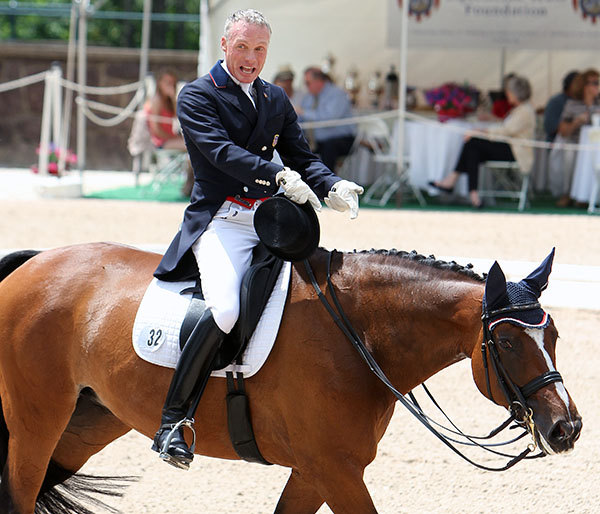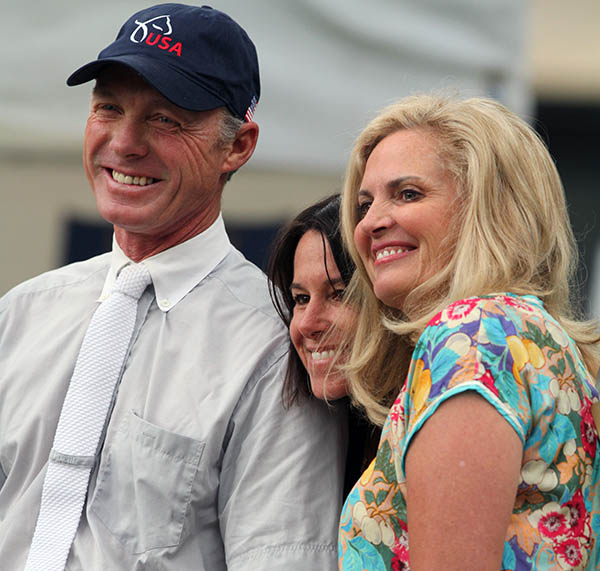Jan Ebeling, Rafalca & the Romneys
12 years ago StraightArrow Comments Off on Jan Ebeling, Rafalca & the Romneys

By KENNETH J. BRADDICK
The brightest spotlight by the global media on Jan Ebeling on Rafalca, a horse part-owned by the wife of possibly the next President of the United States, did not distract the rider from producing the best performances of his life to earning a place on his first American Olympic team at the age of 53.
The soft-spoken and unassuming father of a soccer-playing 12-year-old boy has laughed out loud with the rest of America at an hilarious national television spoof on his dressage. He’s ignored sarcastic digs from late night TV talk show hosts and paid no attention to perhaps the most influential newspaper in the land decrying what it labels “elitism” to score political points in an overheated presidential election campaign. Days later, the same newspaper published a lengthy article on dressage training of Thoroughbred horses for the race track.
Dressage, marking its 100th anniversary in the Olympics, has never had so much attention from mainstream popular media anywhere in the world as it has in the United States this year. Good or bad, never have so many Americans been exposed to as much about the fine or funny points of the sport. And in reverse, the attention from the outside world has brought a large and much needed dose of parody and humor to a sport that oftentimes takes itself too seriously.
Mitt Romney’s nonstop campaigning as the Republican presidential candidate to the elections in November, his membership in the Olympic Family as the successful organizer of the 2002 Winter Olympics in Salt Lake City and Jan’s possible Olympic appearance in London pretty much assures the media scrutiny is likely to be relentless for months to come. What he experienced in Europe when he competed in his third World Cup Final in April with a constant bombardment of requests for interviews was merely a prelude of what was to come.
How did a German immigrant turned Californian and his horse, Rafalca, get to be the center of so much attention?
The 15-year-old Oldenburg mare (Argentinius x Ratine x Rubenstein) is owned by a partnership of Ann Romney, Amy Ebeling and Beth Meyer, an arrangement that is as typical for Olympics horse sports as for any high performance endeavor, from NASCAR to soccer to pre-teen gymnasts. Rarely do athletes no matter how talented make it to the pinnacle of their sport without help.
The genesis of the ties of the former Massachusetts First Lady and possible U.S. First Lady has none of the glamor or celebrity of glabal politics, high finance or big time sports.
Twelve years ago, Ann Romney was diagnosed with multiple sclerosis.
She pursued her passion for dressage as therapy.
Ann first started riding with Jan at the 10-acre (4 Ha.) farm called The Acres owned by he and his wife, Amy, in Moorpark about an hour north of Los Angeles, Back then, Ann could ride the trot on a horse for not even close to a minute and then have to walk for at least anther five minutes because of the crippling effects of MS. A lot of that walking time was, and still is, spent talking about therapeutic riding programs and clubs across the country, many of whom she visits in her extensive travels.
Ann explaind it this way to dressage-news.com:
“When I was nearly incapacitated with my MS, Jan was one of the people who helped me the most.
“I could barely walk, get out of bed, much less ride a horse.
“I feel that the riding therapy and the help I received from him have been instrumental in keeping my MS in remission. Now, I join Jan, who has helped me so much, in pursuit of his life long Olympic dream.”
Jan credits the “sheer willpower” of Ann to accomplish what she has.
What was largely private for years became public in a very big way by the intersection of Mitt Romney’s pursuit of the White House and Jan’s pursuit of representing the United States for the first time in the Olympics.

Unlike many individual athletics, the Olympic equestrian disciplines of dressage, jumping and eventing involve two living creatures that take years of training to perform as one. And in dressage, in particular, where riders are frequently senior citizens–the oldest athlete at this year’s London Games is likely to be Japan’s Hiroshi Hoketsu, to compete in dressage at the age of 71 with his horse, Whisper–there are none of the financial rewards of sports like golf, for example, where top performers also play into their senior years. Even at the top levels of dressage in the United States, victory often means a pretty blue ribbon and, if you’re lucky, getting back your entry fees.
How has Jan reached a stage where he may join fellow German turned Californian Steffen Peters and his 2008 Olympic mount, Ravel, and two other rider and horse combination in the Olympic dressage competition beginning in London on Aug. 2? The United States’ team has the third best record behind Germany and The Netherlands in Olympic competition since the end of the Cold War.
Jan grew up in the Oldenburg area of Germany as a city kid in a high rise apartment. His non-horsey family picked up on his love of animals, although he really wanted to play soccer. They couldn’t afford both sports, so they scraped together a way for him to ride. In return for riding lessons, he cleaned stables and to raise money hawked manure from a wheel barrow to families to fertilize their rose gardens. His riding was successful enough that he became an apprentice to the late great German dressage trainer Herbert Rehbein.
Then in 1984 he came to the United States much like a student tourist and met Robert Dover, one of the top American dressage riders at the time, who urged him to migrate. He moved, first to the East Coast, then Colorado and then on to California 20 years ago where he worked as a trainer at a barn for two years before joining Amy, now his wife, in business.
“The U.S. certainly has given me a fantastic opportunity which I might not have had if I’d stayed in Europe,” he said. “I think I have had access to horses that I may not have had I stayed in Europe.
“This is an amazing country. I just love this country. It has always been and still is a land of opportunity if–and a lot of people forget–you work hard.”
Like most professional horse people, hard work is his way of life and a routine shared by millions of other Americans no matter their pursuit.
Jan gets up at 6 a.m. to get their son, Ben, ready for school and typically is on his first horse to train at 7:30 a.m. He rides until lunch, grabs a sandwich which he usually eats while he starts teaching that goes up to 6 p.m. That’s five days a week. To earn enough money to pay the bills, most of his weekends are devoted to teaching clinics across the country, getting back home Sunday night ready to start again.
“For most of us trainers, we’re all in the same boat,” he said.

The three-way partnership with Rafalca requires him and Amy to pay a third of the costs.
Since he began competing the mare at international level in 2007, he and the mare have performed in three World Cup Finals, in 2009 at Las Vegas, 2011 in Leipzig, Germany, and 2012 in ‘s-Hertogenbosch, The Netherlands. Along with competing at other major European competitions and working with his longtime trainer, Wolfram Wittig, in Germany, and Christine Traurig in California, the support of his partners and grants from the U.S. Equestrian Federation and the U.S. Equestrian Team Foundation are vital to making it possible.
Shawna Harding, his American team mate at the last two World Cup Finals, was in an even tougher situation financially and had to do some serious fund raising on her own to cover the costs of going to Europe to represent the United States, a situation that is typical for horse sports.
“If horses are your business, you cannot turn out the lights at 5 p.m. on Friday and come back Monday morning,” he said. “So when I’m not traveling for clinics on weekends, we’re constantly checking on the horses.
“I wouldn’t have it any other way. It’s the lifestyle I’ve chosen. I get to do my hobby as my job. It’s my passion and I’m very grateful that I’ve able to work as hard as I have to become successful.”
The glare of publicity around him, including the negativity, came as no surprise.
“I have no problems with being criticized,” he said. “My whole job is about criticism. It’s a positive thing if done correctly. If it’s done in a way that is simply cutting people down, I find it rather disgusting. From all of this, I have learned a lot about life and about people and the people you surround yourself with.
“There have been so many positive comments from people I’ve never met before who have came up to me and wished me well.
“The visibiity that Ann brings to the sport can be extremely positive, a real benefit for equestrian sport.”
As to the partership, “It is wonderful to share with our friends the joys and the tears, too.”
How does Rafalca take the attention?
“She doesn’t understand what’s going on. I do, of course, so it’s up to me to remain focused on what we need to do, to go into the ring just like we do every day at home and ride the best we can… and to take care of her.”


